
I was restless last night. I couldn’t fall asleep and was up again at 5:00 AM. I went out to the beach to see the fishermen taking off in their boats, but the beach was silent and the jukung remained on the shore. It is not a good day for fishing apparently.
I went for a walk up the road. This town is so schizophrenic—lots of local life going on:
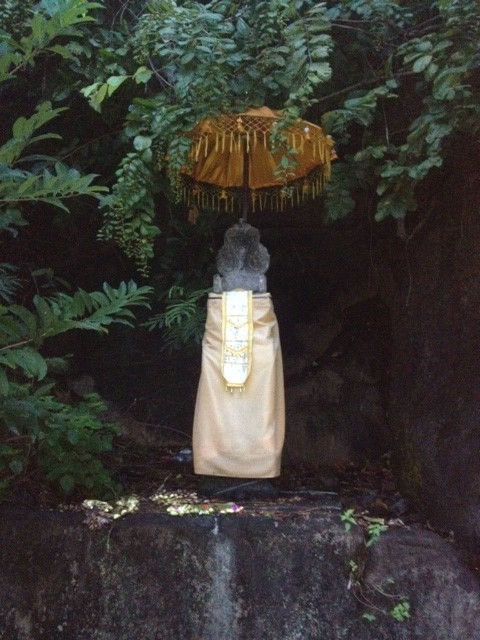
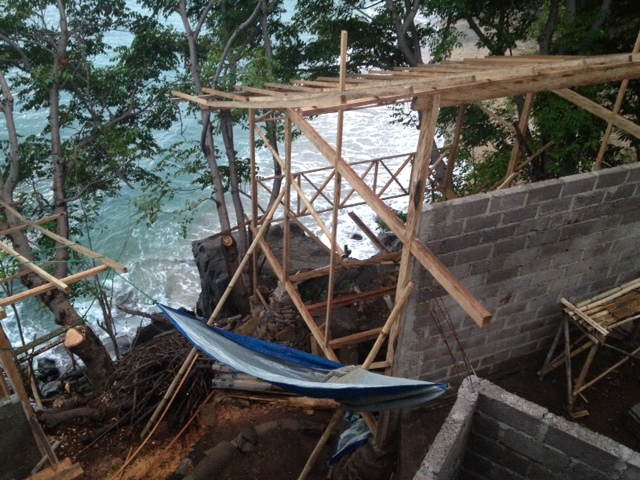
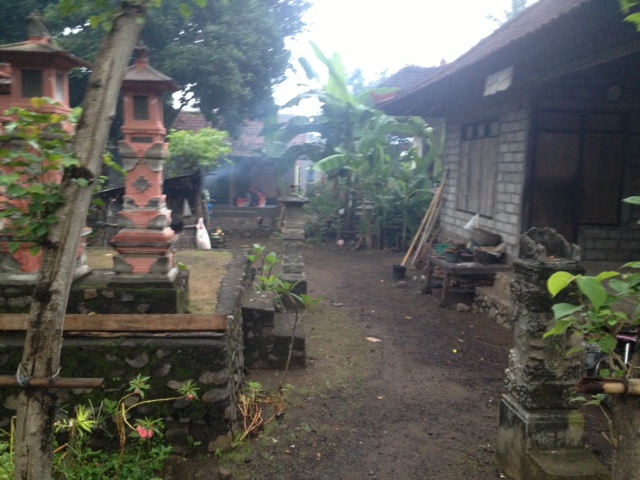
And then there are hundreds of signs like this:
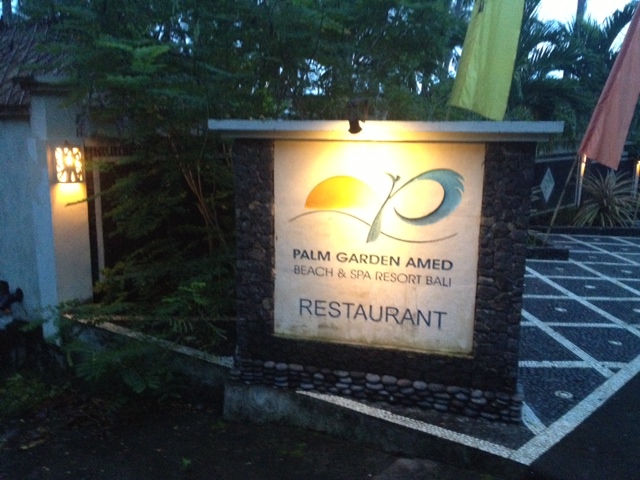
I felt antsy and uncertain about the day. I met a couple of British tourists last night and they said they were going on a 45 K downhill bike ride with the East Bali Bike Company, and I decided to join them. But before I went to bed last night, I read the brochure more carefully and realized that I would be careening down very muddy (big lightening and thunder storm last night) hillsides on a mountain bike, and that is not me. I hate going downhill. I’ve never gone mountain biking or wanted to go mountain biking. Give me a flat road and a street bike, and yes, sure, sign me up. But this ride sounded like a lot more than I really was prepared for physically or mentally.
And then at breakfast, the young man from last night (let’s call him Ketut) came over to chat and asked if I wanted to attend a ceremony with him in his village this afternoon. If I wanted to go, he would pick me up at 2:30. How could an organized activity for tourists possibly compare to an opportunity to experience village life? The choice was a no-brainer.
While I was waiting for the bike guy to arrive so I could tell him I didn’t want to go after all (we couldn’t reach him by phone), I chatted with one of the staff members, Ketut Eka, at the front desk. Eka means “one” and she has that name because she has three brothers and she is the one girl in her family.
As we talked, Eka discarded the old petals from this offering bowl and carefully replaced them with fresh ones. She slid a couple of blossoms on the counter underneath the business cards. That is so Balinese—always creating beauty.
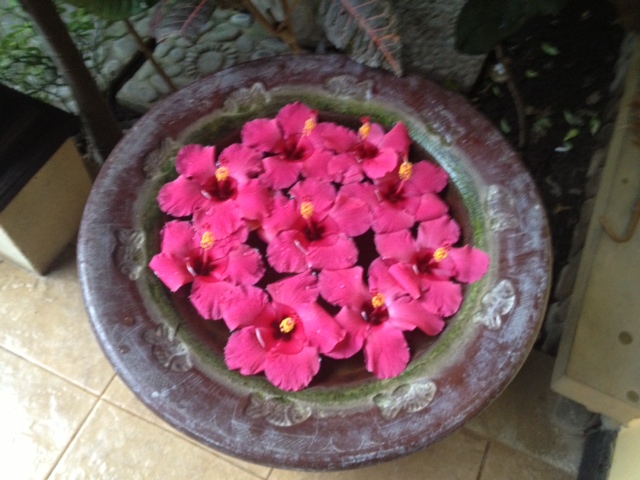
When Eka turned and faced me I realized she was pregnant. I asked her due date and found out she is due the same month as my daughter-in-law, Brinn—just two months from now. That gave us a lot to talk about.
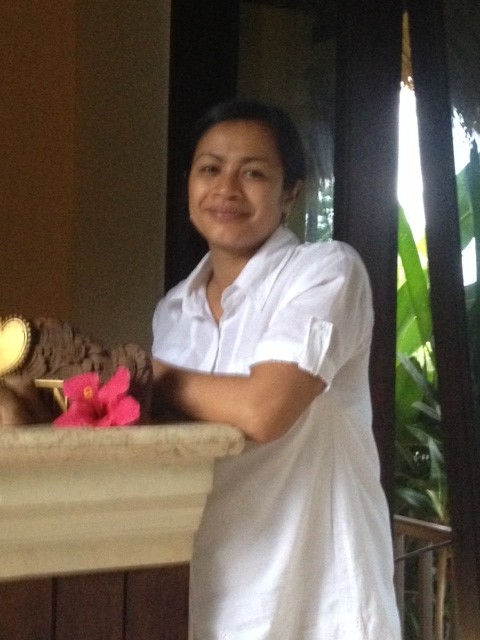
Eka told me about all the ceremonies families have for babies: a ten-day ceremony, a one-month-and-7-days ceremony, a three-month ceremony, another at six months, one for cutting the hair, and so on. Babies’ feet are not allowed to touch the ground for three months. They are carried constantly. That’s what the three-month ceremony commemorates—when the baby’s foot is first allowed to touch the ground.
Eka’s whole family, her husband, four-year-old son and in-laws live in one compound. She, like everyone else I’ve met in the last 24 hours, can’t understand why I’m here alone. When I told her that my partner and older son are in California, that my daughter on her way to Morocco, and my son lives in Boston, she looked at me as if she really felt sorry for me. And I felt sorry for me at that moment too. “In my country, we live very spread apart. Families do not live all together.”
When I said I thought things were better in her country, with everyone under one roof, Eka laughed and said, ‘Yes, unless we are fighting.”
Eka told me that both she and her husband both commute to work in tourism. She is 33 years old and comes from Sebetan Village, famous for its salak (snakefruit) harvest. She could either farm snakefruit or work in tourism and tourism pays better.
Eka’s in-laws care for her son while she and her husband work to support the whole family. Since her village is an hour away, sometimes when she works the evening shift, she sleeps over here and goes back home the next day.
During a Google search about Amed the other day, I read about Bangle Village nearby. In the village, there are five holy springs. The Bangle Holy Waters, also called Toya Masam (Acid Waters) include five springs, each with a different taste. They are believed to contain healing properties – curing cancer, diabetes, kidney stones, stomach and skin problems. The first spring is supposed to be sour (or acidic), the second, sour and astringent. The third one is supposedly sweet, the fourth neutral and the last, extremely bitter. The springs get their tastes from the mineral-rich, volcanic rocks of Mount Seraya.
I told Eka I wanted to go there. I asked if I could walk and she said I’d need to go on motorbike. Ketut was standing nearby and offered to take me. He said that he had been wanting to get some holy water himself. “When do you want to go?” he asked.
“Now?” I replied.
“Now is good,” he said. He told me it would cost $25,000 rupiah to pay a local guide (about $2.50) to lead us to the springs. I went to get the money, the poncho I bought yesterday (it was drizzling) and to exchange my flip-flops for my Keens.
I didn’t know what to expect, but I hopped on the back of his scooter. He bought a liter of gas, handed me a clean empty bottle to hold his holy water, and we took off into the rainy morning. We passed the tourist strip and Ketut turned up to a small road on the left. Suddenly we were on a very rough rutted curvy road. I leaned into him and into the curves and he leaned his elbows on my thigh. It felt like we were one body. As he drove through flooded roads and up windy, steep, pockmarked roads, he asked, “Are you scared?”
“No,” I said. “I love it.”
Very quickly, we were in rural Bali and there was no sign of development or tourists or anything but the local people living their lives much the same way they have for centuries. Whole families were working in the communal rice fields (which Ketut told me also grow peanuts and corn, depending on the season). Little children were planting and carrying plants. Men were plowing with huge yoked oxen and wooden plows. Everyone was working together to create their sustenance:
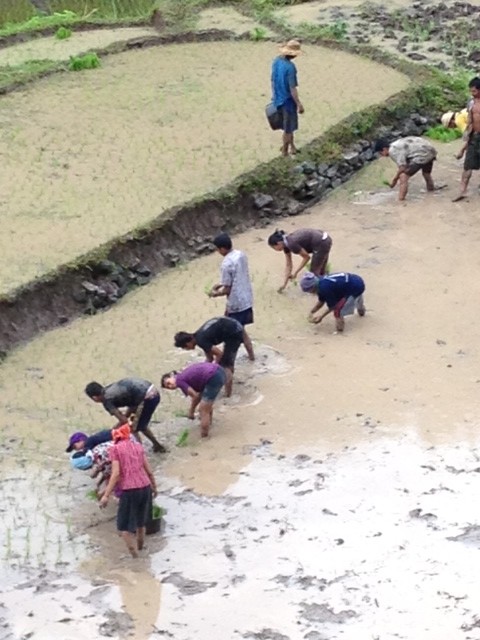
We pulled over onto the side of the road once we reached Bangle Village. Ketut quickly found a teenage boy who agreed to lead us to the spring for a small fee.
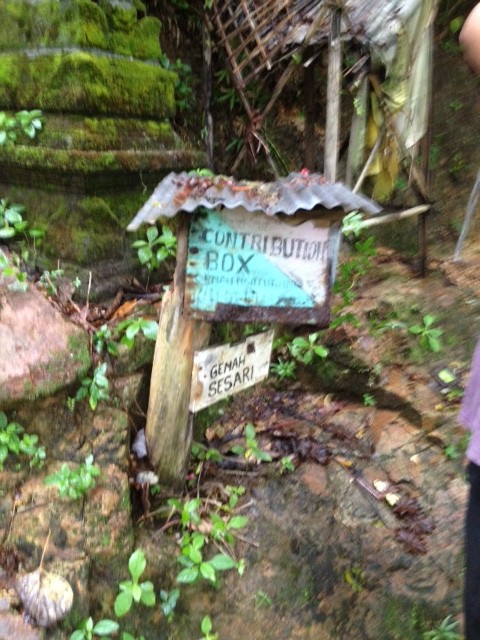
And we followed him up a rocky path that overlooked the rice fields:
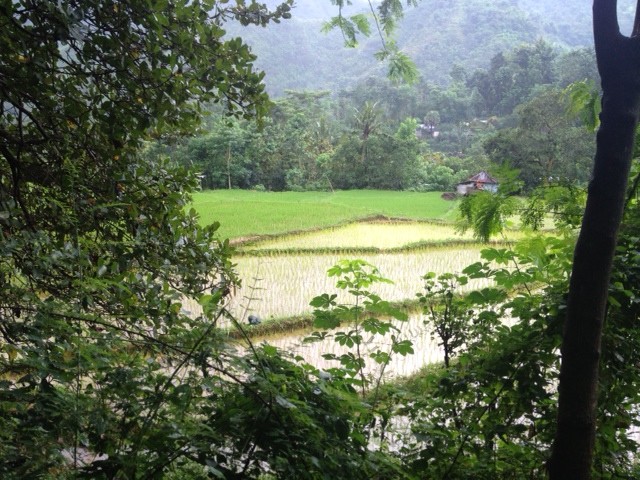
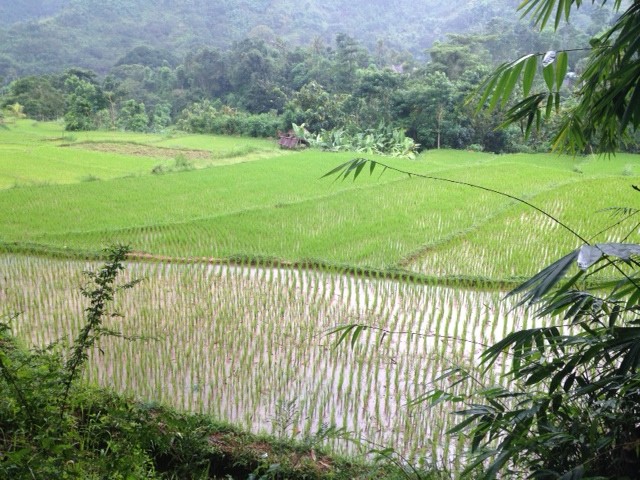
The path meandered for a long time:
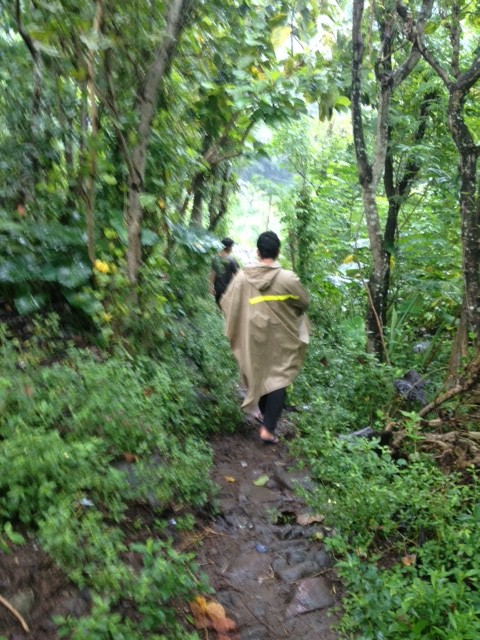
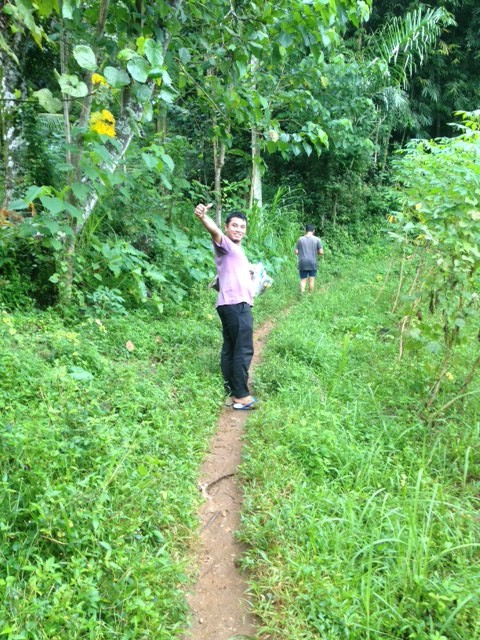
But then it grew rocky and more challenging. The pathway was muddy and slippery and wet. I was grateful that I was wearing Keens rather than sneakers or flip-flops (like Ketut and our guide were). But still I had to clamber up and down the path using my hands to steady me on rocks, tree trunks, anything I could grab that was stable. This was more of a hike and quite a bit more rigorous than I’d expected.
“Like a trek?” Ketut asked.
“Yes,” I replied, smiling. I was loving it. This was way better than a bike ride down a mountain. And I was definitely getting my exercise for the day. We even had to forge a stream crossing:
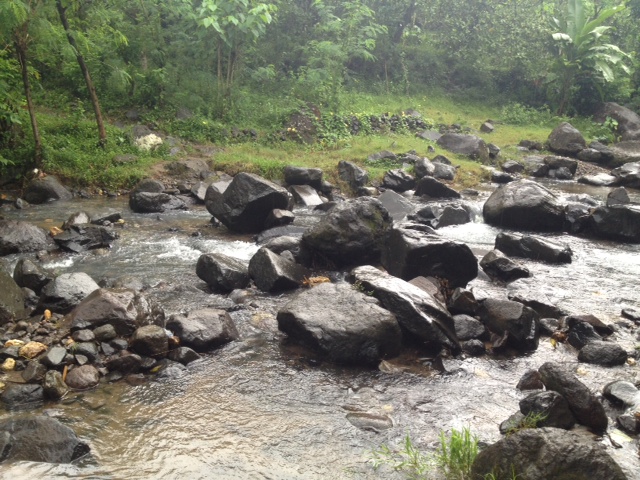
Finally, we reached the first spring. I don’t know I expected—a neat little row of spigots coming out of the ground? We had to hike to each of five separate springs, up and down muddy slopes, rocky outcroppings, and a wide variety of terrain.
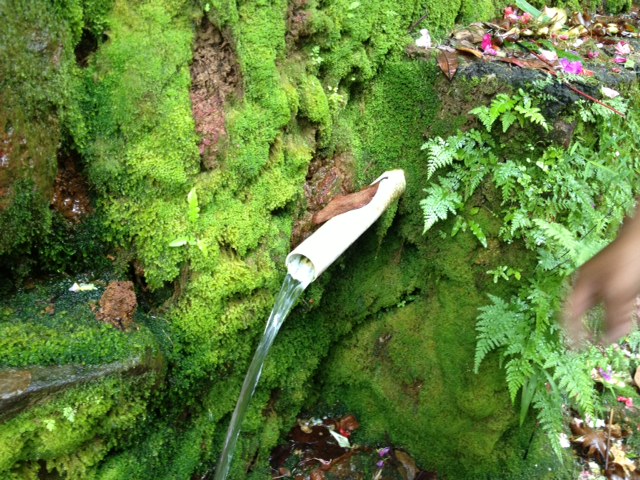
There was a shrine at the first spring. And I paid a donation of $10000 rupiah ($1.00) and signed a guest book. And then I tasted the water.
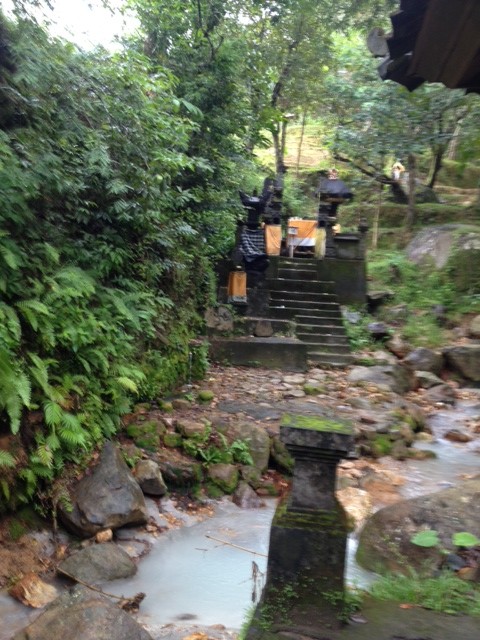
And we climbed to the second spring and the third. The fourth and the fifth. I tasted them all. I couldn’t tell that much difference between them, though the water definitely tasted different. Ketut said they were diluted from the rain and all of the run-off.
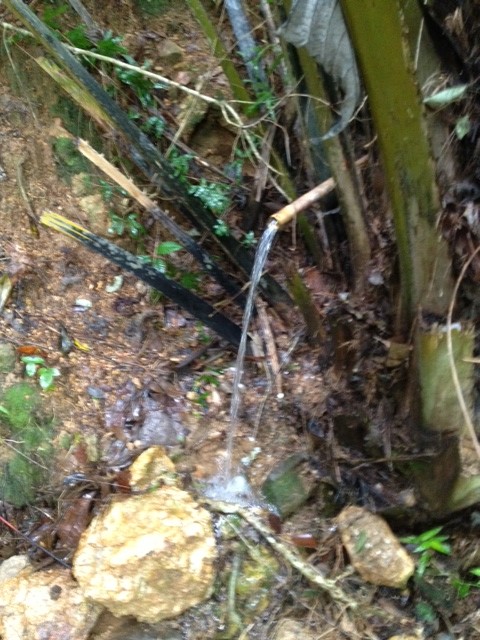
The whole time, with each sip, I was definitely thinking giardia, parasites, (and worse), but I went ahead and tasted them. I figured that the Gods were either protecting me or laughing at me.
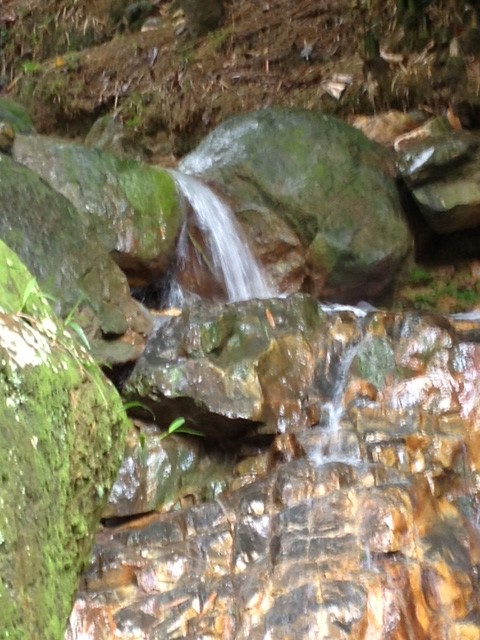
I prayed for healing, even though I wasn’t even sure what I wanted to heal from.
Each time we came to the next spring, Ketut prayed and sprinkled the holy water on his head, and then on mine, and added a little to the bottle I had carried for him.
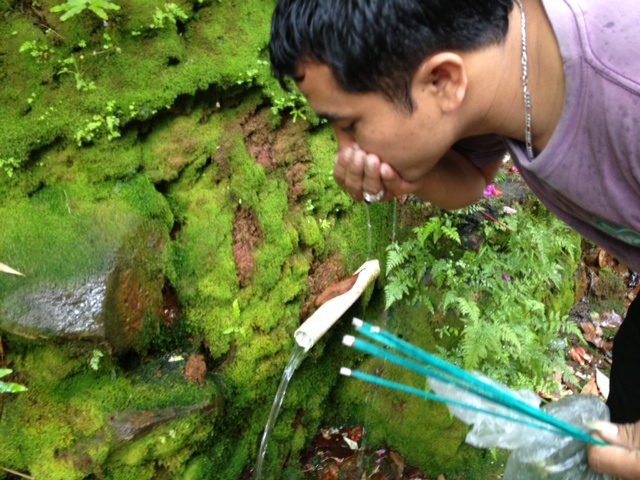
After we drank from the fifth stream, we had a long hike back down to the village road, and we had to cross the stream again. Partway down, Ketut’s foot got stuck in the mud and when he slurped it up out of the mud, his flip-flop was broken.
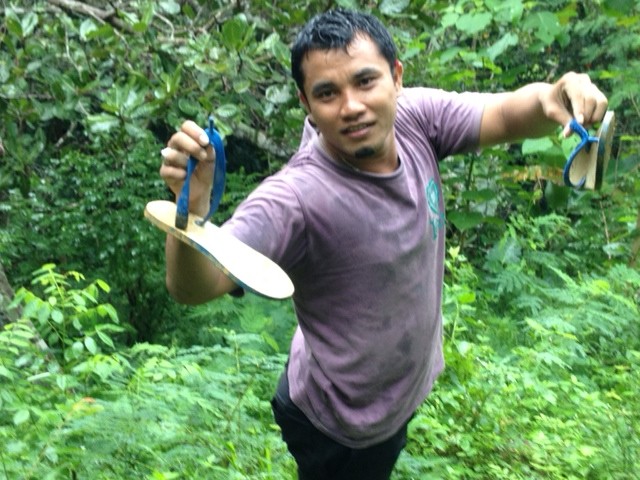
He left them by the side of the trail and clmbed the rest of the way down barefoot. The views from the bike on the way down were exquisite. It was the old, real untouched Bali and I was so grateful to see it. When we got back to the hotel, I had Ketut go to the warung across the street and I bought him gas for the bike and a new pair of flip-flops. And then I went back to my room to rest.
This was my six-dollar lunch: a huge piece of fresh grilled tuna, rice piled in a cone with a banana leaf, Balinese vegetables, and fresh sambal. To quote my friend Allison, “yum!” The food is excellent here. No reason to eat anywhere else during my stay.
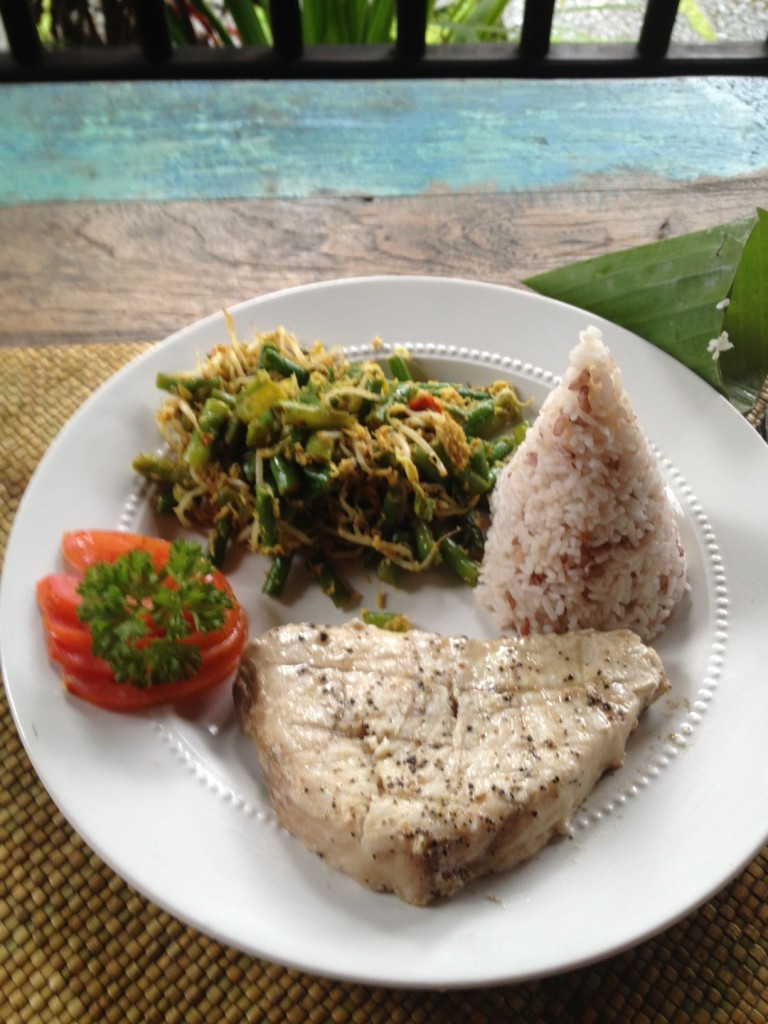
Now I’m resting and reading until its time to go to the ritual. It is quite a rainy day, but it’s a warm rain. It doesn’t look like its going to let up, but here in Bali, you never know.
Later….I napped and got dressed and packed my sarong and temple scarf in my backpack, threw a poncho over it all. I went out front to wait for Ketut to pick me up for the ritual. It was pouring and he didn’t come. Fifteen minutes later, he called the office to say he couldn’t come because it was raining too hard in his village. I was disappointed, but happy he had made the effort to get a message to me. I feel connected to him. I will never forget him. I hope I get to see him again before I leave Amed tomorrow.
Now I am alone, the only guest in this whole hotel, on a very rainy day with the rest of the afternoon stretching out before me. My immediate impulse is to want to DO something, but maybe it is okay to just rest. To read. To head out of here early tomorrow morning for Candidasa and the Lotus Bungalows, the first place I landed in Bali last year.
It’s interesting for me to note that even here in Bali, I want to be doing something, that the idea of the rest of the day with nothing but dinner in front of me—dinner alone—is a challenge. It’s hard for me to sit with just feeling lonely, but I think that’s exactly what I need to do.
Later still…I went out for another walk in the rain and just took pictures of some of things that caught my eye. On my way back from the hotel, I was practicing my greetings in Indonesian with everyone I passed (more on this another day). I was using the proper greeting for afternoon, Selamat Sore to a man and his wife sitting on a wooden deck outside their shack, right on the road. The man returned my greeting and said to me in English, “Come to my house.”
I did a double take to be sure and he was gesturing me over and he repeated his words. He spread a red blanket down on the wooden deck and gestured for me to sit, and asked if I wanted a cup of Balinese coffee. I hate the stuff, but of course, I nodded yes and his wife, who spoke no English, went to make it.
The man’s name introduced himself as Ketut Sadra. Like many of the people I’ve met in Amed, he was eager to practice his English since English-speakers are more likely to capture tourist business and tourist dollars.
I sat down cross-legged in front of him, being careful not to point my feet at him (an insult to the Balinese), as I tried to remember all the etiquette I learned from Judy and Surya last year.
Ketut told me he was 33 years old. I asked if he were a fisherman. He said he used to be, but then he showed me the large hump on his back and said he was injured and he had to sell his boat to go to the doctor. Now he was trying to work on the beach with the tourists to take them snorkeling and fishing.
Ketut Sadra and his wife have two children. Their Wayan, their oldest, is 11, and the youngest, 7. Two boys. Inside the house, I could hear the voice of his mother, an older voice, and see her hand gesture through the doorway.
I asked about the childrens’ schooling. Ketut Sadra said sometimes they got to go to school; other times they can’t. It costs 5000 rupiah, or 50 cents, every day for transportation to school, and if there are no tourists buying his services, his sons can’t go to school. “The fifty cents,” he told me, doesn’t include their books or their shoes.”
As I drank my overly sweet, thin Balinese coffee, and ate a proffered bright yellow pastry with a bright red sweet center (the Balinese equivalent of a Twinkie), Ketut Sadra asked, as everyone does, “Where is your husband?” I answered as I’ve learned to do, “meeting me in Candidasa,” because to say I have a wife, and not a husband, is just too hard for these struggling conversations.
Ketut Sadra told me there were cockfights 3 kilometers away and made it clear that people were gambling. He asked if I wanted to go and I said no. I’m all for taking part in this culture, but watching roosters peck each other to death in an illegal cockfight was definitely not something I was up for. He also tried to convince me that his cousin could drive me to Candidasa. I told him, sorry, that I had already arranged a ride.
As we talked over the next half hour, I taught Ketut some new English words and he taught me some new Indonesian ones:
What’s your name? Siapa namamu?
Where are you going? Di mana anda akan pergi?
Outside: di luar
In front: di depan
Behind: di belakang
Beside: di samping
He also taught me that the local fishermen only fish for mackerel. Mahi mahi ad tuna, which I’ve been eating on a daily basis are harvested further away.
Toward the end of my visit, Ketut’s oldest son, Wayan, came home and shyly greeted me. Then he sat next to his mother, who immediately took out a lice comb and started working through his hair.
Before I left and said my selamat singal, I asked if I could take Ketut’s picture. He said yes and wanted to pose with one of the wooded boat models he sells to tourists. Then he wrote down his email address for me in my little notebook in the hopes I could send some tourist business his way. I really wish I could. There is such poverty here.
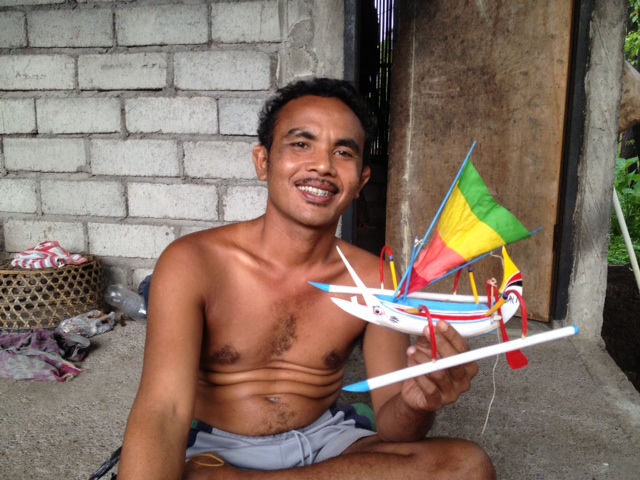
Back at my hotel, I decided I wanted a massage. When I asked if they could set one up for me, they asked if I wanted a local massage or a professional massage. The local massage costs $8.00 an hour and is done by one of the local (uncertified, untrained) woman. A professional massage is done at one of the spas and costs twice as much. I opted for the spa massage and paid 200,000 rupiah or $20 dollars. It was a so-so massage, but it was heaven to lie naked on a table listening to roosters and the wind and the evening call to prayer, to feel a warm breeze on my body and listen to the rain stop and then start again in a downpour.
I was well aware of the fact that I was spending half of a tourist worker’s monthly salary on what I considered a bargain massage.
Now I am warm and clean and relaxed and it’s almost time for dinner. I think I’ll have the mahi mahi again tonight. With a salad. And another piece of that divine lemon cheesecake. You usually don’t get western desserts in Bali. The ones at this place are definitely a treat.
I think I’ll go to bed early tonight, read until I fall asleep. I’ve booked a car for $25.00 to take me to Candidasa tomorrow morning. That’s where I’ll be welcoming Karyn and our group a few days from now. It’s time for me to get ready to be the teacher again.
I only hope I get to see “my” Ketut tomorrow morning before I take off. I’d like to give him a generous tip for being my tour guide and for trusting me with his story.
P.S. To those of you taking this virtual vacation with me, I just want you to know how very much your comments mean to me. It takes me so long to write each post that I don’t also have time to respond to you individually, but I want you to know that from across the world, I savor every comment you make, so please keep them coming. I LOVE hearing from you! In particular, if you have any stories or advice about traveling alone, I’d love to hear them!
